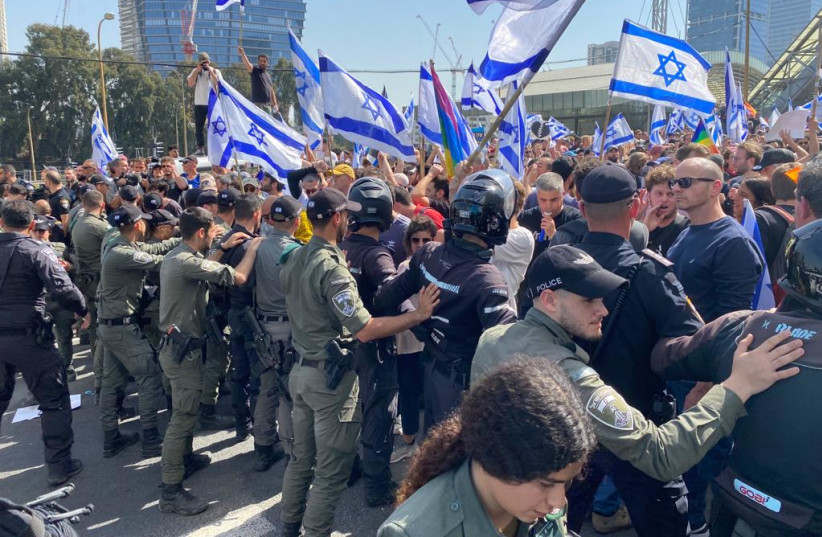Violent judicial overhaul protesters are akin to the settlers that attacked the West Bank Palestinian town of Huwara, Prime Minister Benjamin Netanyahu said on Wednesday night.
“We will not accept lawbreakers and violence, not in Huwara, not in Tel Aviv, not anywhere.”
Prime Minister Benjamin Netanyahu
"We won't accept violence, police beating, blocking of roads. We cannot accept threats against public figures and their relatives. We will not accept lawbreakers and violence, not in Huwara, not in Tel Aviv, not anywhere,” Netanyahu said.
He referenced a Sunday night incident in which Jewish vigilantes burned dozens of homes and vehicles in an attack on Huwara in which one Palestinian man was killed.
The violence followed a Palestinian gunman’s fatal shooting of two brothers Hallel and Yagel Yaniv, as they drove through Huwara.
Opposition leader MK Yair Lapid (Yesh Atid) said that "Huwara was a pogrom carried out by terrorists" yet Netanyahu compared it to a protest movement that involves IDF officers, doctors and students who "took to the streets today." Lapid said that those protesters "are the best people in Israel. It was a horrible, quarrelsome statement from a weak and dangerous man."

Labor Party leader Merav Michaeli said that Netanyahu shouldn't "compare patriots fighting for democracy with anarchists burning houses in Huwara.”
"After two months in office, the State of Israel is falling to pieces and all because you are focused only on your plan to evade justice. It's all in vain. Democracy will win. And it will beat you, too,” she stated.
Netanyahu, however, said that those who were protesting against the government’s judicial reform plan were harming democracy.
He spoke after a day of country-wide protests in which protesters in some instances blocked roads and clashed with police.
“In a democracy, there are clear rules about how to have a debate. There are red lines that cannot be crossed and it does not matter how deep, stormy and emotional the debate is.
“The sharp and clear red line is that violence and anarchy are absolutely forbidden,” Netanyahu said.
Netanyahu: disengagement protesters an example of correct protesting
He compared the deep emotions over the judicial overhaul plan with the 2005 Disengagement in which Israel pulled out of Gaza, destroying 21 settlements there and four in northern Samaria.
“Twenty years ago, the debate among us was no less stormy, no less wrenching, and no less all-embracing. An entire public that deeply opposed the government's policy felt that its world was being destroyed.
“Twenty years ago, in the Disengagement, the Government of Israel decided to uproot over 8,000 Israelis from their homes, to exhume bodies, and to destroy their communities,” he said.
“Those who opposed the policy of the Government saw their life's work crumbling and many of them believed with all their heart that this was the start of the destruction of the Third Temple.
“They set out on a sharp and determined struggle, a pointed and powerful public struggle that encompassed many people in the country,” Netanyahu said. He presented those protests, which much like the current ones had both peaceful and violent moments, as a totally peaceful movement.
There were those disengagement protesters who also blocked roads and clashed with police. One of the central themes of the protest was a persistent call for security forces to refuse to obey orders relating to Disengagement, in the hopes that if soldiers failed to act then the Gaza pullout would not occur.
Netanyahu, however, rewrote that history when he stated that during the disengagement, “we did not see then what we see today. The demonstrators did not beat policemen, did not call for civil riots, did not call for refusals.”
At the time of the disengagement, Netanyahu was a member of the Likud party, which at the time was led by former Prime Minister Ariel Sharon. He was a Finance Minister in the government during most of the protests and voted a number of times for the plan. He resigned in protest only shortly before the pull-out.
But yet he described himself as one of the leaders of the opposition at the time.
“Back then, the opposition under my leadership behaved responsibly, today, unfortunately, the opposition [today] behaves irresponsibly,” Netanyahu said.
